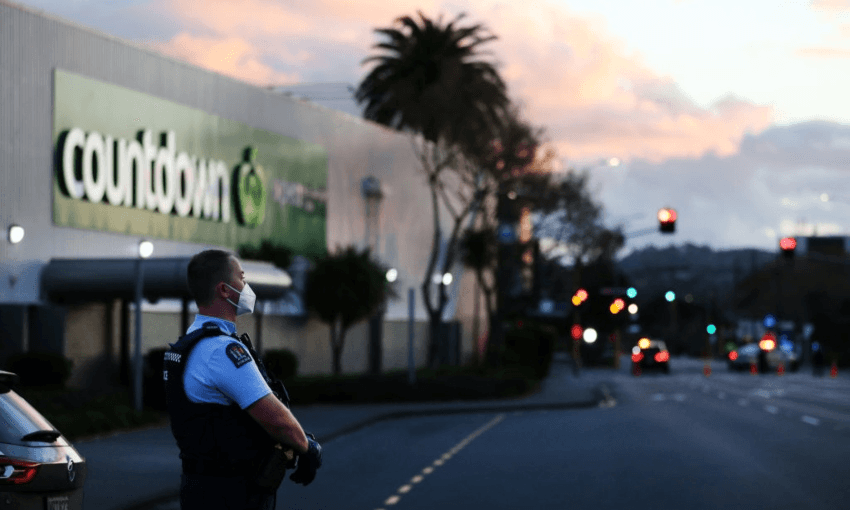We must ask what we can do as a country, as communities and as individuals to stop the spread of hate. Today we stand with the injured and their families, ready to help in whatever way we can, writes Anjum Rahman.
In June this year, the director of our Security Intelligence Services told the He Whenua Taurika conference in Christchurch “if a terrorist attack were to be committed in New Zealand in the next 12 months, it would be carried out by a lone actor, without any detectable forewarning … We think it would most likely be carried out using easily available weapons such as knives, vehicles, or some types of firearms.”
This prediction became a reality on Friday when we had a mass attack at LynnMall Countdown. As news of the awful event unfolded, many of us felt shock, horror and grief. It was devastating to hear that members of the public were critically injured, and they remain at the forefront of our minds as we pray for their recovery.
As a community, we understand the lasting impacts of an event like this as well as the number of people who are affected. For the families of the injured, this is an incredibly difficult time, made even more difficult with lockdown. The inability to hold a vigil, to visit or provide support as we might have done in other circumstances takes away one means of showing our support. We can only hope they know that the country is with them, ready to help in whatever way we can.
There is something disturbingly familiar in the aftermath. As we gradually get more details, we want to know why this attack could have happened, why the offender wasn’t stopped. We want to know what went wrong and what needs to change. There’s an urgent desire to act, to do something. To do anything, whatever needs to be done to make us feel safe again.
The sad reality is that there are never any simple answers. There can, however, be poorly thought out and rushed attempts at solutions. When a tragedy like this happens, the rush to legislation seems to be the one sure answer for leadership to give the impression that action is being taken, that they are being tough and decisive.
Time and again, we have seen counter-terrorism legislation rushed through the house. Each piece of legislation erodes our privacy, our liberties and our rights. Legislation rushed through urgency means that there isn’t sufficient scrutiny to ensure that what we give up will increase our security.
The analysis of Andrew Geddis is helpful. When the Counter-Terrorism Bill passed first reading in April, I expressed my concerns with the definition of terrorism being widened, and our submission to the legislation outlines further issues as do the submissions of many others. These are complex issues that require due attention. The state needs to make the case that the provisions particular legislation will actually make us safer, that it won’t adversely impact individuals and communities, it won’t suppress protest and dissent.
During the research for my submission and in reading the Royal Commission report, I was aware of the court case regarding “S”, and the judge’s comments about the lack of a planning offence in our terrorism laws. Little could I imagine that this person would go on to commit this terrible crime.
It’s been a difficult month for us in Aotearoa, as we have dealt with a pandemic, flooding, and the situation in Afghanistan. As we try to catch our breath, as we think about how we can begin to heal, I want to acknowledge and appreciate political and other leaders who have taken a sensible and sensitive approach to this event. We need the media to do the same.
Aotearoa was a model in the response to the Christchurch mosques attacks. I know we can be again. The Muslim community rose to the challenge of that tragedy, and we will do our best in our response to this one. We know that other communities will too, and I would especially like to express solidarity with the Sri Lankan community at this time.
In the coming days and weeks, various investigations will take place and more information will be in the public domain. There will be a time for accountability and for the tough questions to be asked. When were the intervention points, and were the intervention points sufficient? Were there any deradicalisation programmes available to the attacker?
What was the programme of support on his release and who was responsible for working with him to provide the assistance needed to ensure he didn’t continue in the direction he was headed? Mostly importantly, what must we do as a country and as communities and individuals to stop the spread of hate?
Right now, the government is working on reforming hate speech legislation and developing its social cohesion work stream. Not all of the solutions can lie with government. Communities must organise and act. Most of all government must work with and empower communities to take on the challenge before us. Just as we’re not prepared to just live (and die) with Covid, we cannot be prepared to live with extremism, disinformation and the violence it produces.
